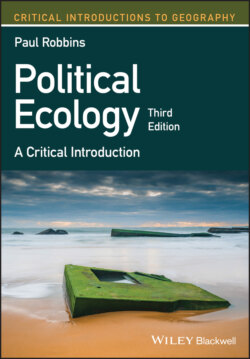Читать книгу Political Ecology - Paul Robbins - Страница 19
Other apolitical ecologies: diffusion, valuation, and modernization
ОглавлениеOther prominent accounts of environmental change also dominate current thinking, asserting apolitical answers to extremely political questions. It is commonly argued, for example, that ecological problems and crises throughout the world are the result of inadequate adoption and implementation of “modern” economic techniques of management, exploitation, and conservation. Generally, this way of thinking is underpinned by a commitment to economic efficiency.
These approaches to environmental management and ecological change generally assert that efficient solutions, determined in optimal economic terms, can create “win–win” outcomes where economic growth (sometimes termed “development”) can occur alongside environmental conservation, simply by getting the prices and techniques right. Such approaches are persuasive, at least insofar as they reject the cataclysmic prognoses of Malthusian catastrophe described above. By freeing individuals and firms to seek their own best and most efficient use of resources, propelled by competition on an open market and sustained by modern technology, waste, environmental destruction, and resource degradation might be tamed.
For global ecology, such an approach suggests several general principles and policies. (1) Western/northern technology and techniques need to be diffused outwards to the underdeveloped world. (2) Firms and individuals must be connected to larger markets and given more exclusive property controls over environmental resources (e.g., land, air, wildlife). (3) For wilderness and biodiversity conservation, the benefits of these efficiencies must be realized through institutionalizing some form of valuation; environmental goods like wildebeest, air, and stream quality might be properly priced in an open market.
The debates and critiques surrounding such approaches and the logics that underpin them are too numerous to summarize here; even so, there are some serious general conceptual and empirical problems with this perspective. First, the assertion that modern technologies and markets can optimize production in the underdeveloped world, leading to conservation and environmental benefits, has proven historically uneven. The experience of the green revolution, where technologies of production developed in America and Europe were distributed and subsidized for agrarian production around the world, led to what even its advocates admit to be extensive environmental problems: exhausted soils, contaminated water, and increased pest invasions (Lal et al. 2002). Beyond these failings, the more general assertion that superior environmental knowledge originates in the global north for transfer to the global south is in itself problematic, reproducing as it does paternalistic colonial knowledge relations and a priori discounting the environmental practices of indigenous and local communities (Uphoff 1988). Efforts to price the economic value of environmental systems – most commonly referred to as “ecosystem services” in this approach – can result in remarkable unjust outcomes (Sikor 2013). A call to intensify these forms of exchange must be viewed skeptically.
On the other hand, certain kinds of modernization, at least those technological advances that have been seized by the world's poorest people to unleash their capacities and meet their aspirations, are unquestionable environmental goods (Shellenberger and Nordhaus 2007). Consider the power and ubiquity of cell phones across Africa and South Asia, which have allowed famers to time their access to markets and improved livelihoods and the efficiencies of their systems of production. Similarly, revolutionary advances in modern rural medicine have empowered women, enabled careful planning of labor and reproduction, all the while improving the day‐to‐day quality of life. Even genetically modified organisms, with their many downsides, have availed themselves to the inventiveness of rural people, curtailed pesticide usage, and opened new livelihood strategies (Herring 2006, 2007). It would be folly for critical theorists and thinkers to allow their distrust of economistic thinking to blind them to the power of progressive technological change (Phillips 2015; see also Chapter 13).
Asserting and adopting the apparently apolitical approach suggested in market and modernization approaches, however, because of the institutional and political changes that such an approach requires, is inherently political. To individuate and distribute “collective” goods like forests or water by necessity requires the alienation of previous user groups. To implement new technological approaches in agriculture, resource extraction, or wilderness management requires a transformation of existing and traditional institutions, where new winners and losers might emerge. There is nothing apolitical about such proposals.
The first lesson to draw is that the dominant contemporary accounts of environmental crisis and ecological change (ecoscarcity and modernization) tend to ignore the significant influence of political economic forces. As we shall see, this is to ignore the most fundamental problems in contemporary ecology. The other lesson is that apolitical ecologies, regardless of claims to even‐handed objectivity, are implicitly political. It is not so much that political ecology is “more political” than these other approaches to the environment. Rather it is simply more explicit in its normative goals and more outspoken about the assumptions from which its research is conducted.
